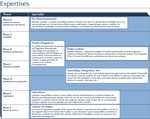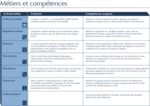the CENSUS spirit, a link between pros and pros-to-be
The CENSUS space campus fosters projects of conception and realisation of nanosatellites. Through the development of these projects, CENSUS is preparing the spatial instrumentation of tomorrow and renewing the working methods implemented for the management of complex projects.
How to work collectively for such a project? How to train in engineering complex systems? CENSUS responds to this problem by bringing together students and professionals through the development of nanosatellites.
Through various training programs and the networks that support them, CENSUS makes it possible to combine needs between students and project managers supported by the labex ESEP. Through previous experiences many lessons are learnt.
For students:
- They play an important role in a real project in contact with experts from the space sector;
- They are at the forefront of the concrete development of a space project, from conception to completion;
- They are formed via the complexity of a space project whose different phases they can master.
For the projects:
- New projects can be initiated, developed and realised by the participation of many students from various backgrounds;
- They benefit from the methodological openings developed by the space campus.





